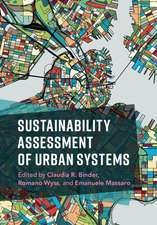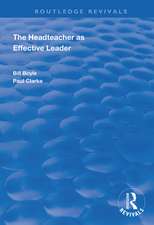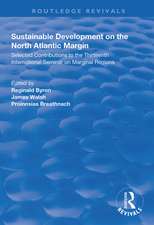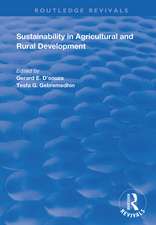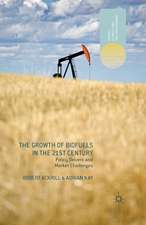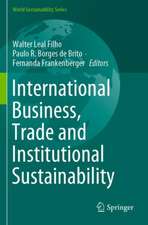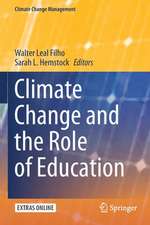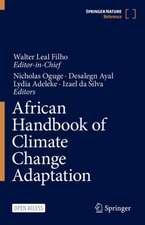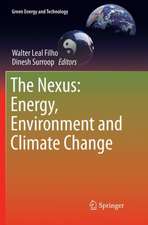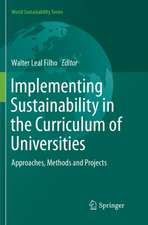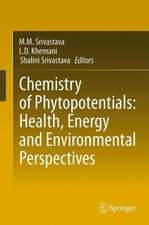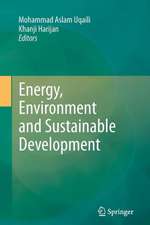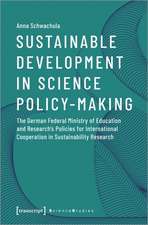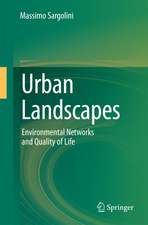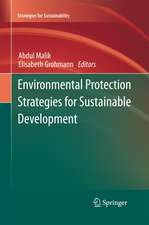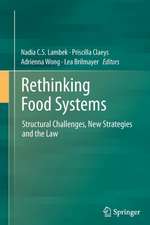Climate Action: Encyclopedia of the UN Sustainable Development Goals
Editat de Walter Leal Filho, Anabela Marisa Azul, Luciana Brandli, Pinar Gökcin Özuyar, Tony Wallen Limba Engleză Hardback – 18 oct 2019
The problems related to the process of industrialisation such as biodiversity depletion, climate change and a worsening of health and living conditions, especially but not only in developing countries, intensify. Therefore, there is an increasing need to search for integrated solutions to make development more sustainable. The United Nations has acknowledged the problem and approved the “2030 Agenda for Sustainable Development”. On 1st January 2016, the 17 Sustainable Development Goals (SDGs) of the Agenda officially came into force. These goals cover the three dimensions of sustainable development: economic growth, social inclusion and environmental protection.
The Encyclopedia of the UN Sustainable Development Goals comprehensively addresses the SDGs in an integrated way. It encompasses 17 volumes, each one devoted to one of the 17 SDGs. This volume addresses SDG 13, "Take urgent action to combat climate change and its impacts", and contains the description of a range of terms, which allows a better understanding and fosters knowledge. Climate change is a threat to development with unprecedented impacts. Urgent action to combat climate change and development of integrated strategies on climate change mitigation and adaptation and sustainable development are critical for a sustainable future.
Concretely, the defined targets are:
The Encyclopedia of the UN Sustainable Development Goals comprehensively addresses the SDGs in an integrated way. It encompasses 17 volumes, each one devoted to one of the 17 SDGs. This volume addresses SDG 13, "Take urgent action to combat climate change and its impacts", and contains the description of a range of terms, which allows a better understanding and fosters knowledge. Climate change is a threat to development with unprecedented impacts. Urgent action to combat climate change and development of integrated strategies on climate change mitigation and adaptation and sustainable development are critical for a sustainable future.
Concretely, the defined targets are:
- Strengthen resilience and adaptive capacity to climate-related hazards and natural disasters in all countries
- Integrate climate change measures into national policies, strategies and planning
- Improve education, awareness-raising and human and institutional capacity on climate change mitigation, adaptation, impact reduction and early warning
- Implement the commitment undertaken by developed-country parties to the United Nations Framework Convention on Climate Change to a goal of mobilizing jointly $100 billion annually from all sources to address the needs of developing countries in the context of meaningful mitigation actions and transparency on implementation and fully operationalize the Green Climate Fund through its capitalization as soon as possible
- Promote mechanisms for raising capacity for effective climate change-related planning and management in least developed countries and small island developing states, including focusing on women, youth and local and marginalized communities.
Editorial Board
Anabela Marisa Azul
Dragan Nonic
Federica Doni
Jeff Birchall
Luis R. Vieira
Silvia Serrao Neumann
Ulisses Azeiteiro
Din seria Encyclopedia of the UN Sustainable Development Goals
- 18%
 Preț: 3893.48 lei
Preț: 3893.48 lei - 18%
 Preț: 3610.14 lei
Preț: 3610.14 lei - 18%
 Preț: 3367.85 lei
Preț: 3367.85 lei - 18%
 Preț: 3882.42 lei
Preț: 3882.42 lei - 18%
 Preț: 3896.62 lei
Preț: 3896.62 lei - 18%
 Preț: 3880.85 lei
Preț: 3880.85 lei - 18%
 Preț: 3344.20 lei
Preț: 3344.20 lei - 18%
 Preț: 3352.06 lei
Preț: 3352.06 lei - 18%
 Preț: 3359.96 lei
Preț: 3359.96 lei - 24%
 Preț: 2926.08 lei
Preț: 2926.08 lei - 18%
 Preț: 3408.87 lei
Preț: 3408.87 lei - 18%
 Preț: 3404.14 lei
Preț: 3404.14 lei - 18%
 Preț: 3413.60 lei
Preț: 3413.60 lei - 18%
 Preț: 3404.14 lei
Preț: 3404.14 lei - 24%
 Preț: 2427.06 lei
Preț: 2427.06 lei - 24%
 Preț: 2915.07 lei
Preț: 2915.07 lei
Preț: 3402.30 lei
Preț vechi: 4476.72 lei
-24% Nou
Puncte Express: 5103
Preț estimativ în valută:
651.10€ • 707.01$ • 546.93£
651.10€ • 707.01$ • 546.93£
Carte disponibilă
Livrare economică 28 martie-03 aprilie
Livrare express 15-21 martie pentru 290.09 lei
Preluare comenzi: 021 569.72.76
Specificații
ISBN-13: 9783319958842
ISBN-10: 3319958844
Pagini: 1000
Ilustrații: XXIV, 882 p. 81 illus., 59 illus. in color.
Dimensiuni: 178 x 254 mm
Greutate: 2.07 kg
Ediția:1st ed. 2020
Editura: Springer International Publishing
Colecția Springer
Seria Encyclopedia of the UN Sustainable Development Goals
Locul publicării:Cham, Switzerland
ISBN-10: 3319958844
Pagini: 1000
Ilustrații: XXIV, 882 p. 81 illus., 59 illus. in color.
Dimensiuni: 178 x 254 mm
Greutate: 2.07 kg
Ediția:1st ed. 2020
Editura: Springer International Publishing
Colecția Springer
Seria Encyclopedia of the UN Sustainable Development Goals
Locul publicării:Cham, Switzerland
Cuprins
Strengthen resilience and adaptive capacity to climate-related hazards and natural disasters.- Improved education, awareness-raising and human and institutional capacity on climate change mitigation, adaptation, impact reduction and early warning.- Developing countries to implement the Green Climate Fund through meaningful mitigation actions.
Notă biografică
Walter Leal Filho (BSc, PhD, DSc, DPhil, DEd, DL, DLitt) is a Senior Professor and Head of the Research and Transfer Centre "Sustainable Development and Climate Change Management” at Hamburg University of Applied Sciences in Germany, and Chair of Environment and Technology at Manchester Metropolitan University, UK. He is the initiator of the Word Sustainable Development Symposia (WSSD-U) series, and chairs the Inter-University Sustainable Development Research Programme. Professor Leal Filho has written, co-written, edited or co-edited more than 400 publications, including books, book chapters and papers in refereed journals.
Anabela Marisa Azul is a Researcher at the Center for Neuroscience and Cell Biology (CNC) and the Institute for Interdisciplinary Research of the University of Coimbra (UC, Portugal). She holds a Ph.D. in Biological Sciences, specializing in Ecology (2002, UC), and pursued her investigation on biology and ecology of fungi to pinpoint the role of mycorrhizal symbiosis for sustainability of Mediterranean forests under different land use scenarios at the Centre for Functional Ecology (CFE-UC), where she became an Associate Researcher (from 2009 to 2014). At CFE-UC, Marisa Azul developed a holistic approach that combined innovation in food production with sustainable development and public scientific awareness to multiple actors. At CNC, from 2014 on, Marisa Azul focuses her investigation on basic research and participatory research dynamics to pinpoint links between metabolism, health/disease, and sustainability. She has broad academic experience as a researcher working in participatory research and interdisciplinary that link biomedical and life/environmental sciences, social sciences, science education, science communication, and artistic forms. Her research interests also lie in bringing together the academy and social/economical players. She has been successful in attracting nationaland international funding, coordinating projects, and mentoring young researchers on the topics mentioned. She has co-authored over 40 scientific publications and book chapters, co-edited 4 books on Climate Change Management Series and 1 onWorld Sustainability Series published by Springer, co-authored 4 books for children and 2 comics, and co-produced 1 animation.
Luciana Brandli, Ph.D., is an Associate Professor in the University of Passo Fundo, Brazil, working in the Ph.D. Program in Civil and Environment Engineering. Her current research interests include sustainability in higher education and green campus, management of urban infrastructure and sustainable cities, and the Agenda 2030 for sustainable development. She supervises a number of Master’s and Doctoral students on engineering and environment and sustainability issues and has in excess of 300 publications, including books, book chapters, and papers in refereed journals.
Pinar Gökçin Özuyar is a Faculty Member of Faculty of Economics, Administrative and Social Sciences at Istinye University, Istanbul, Turkey. She received her B.S. degree in Environmental Engineering from Istanbul Technical University in 1992 and M.S. and Ph.D. degrees from Bogazici University Institute of Environmental Sciences, Istanbul, Turkey. Her Ph.D. thesis was based on the “Thermodynamic Analysis of Treatment Plants for Producing Energy from SolidWaste” which she conducted in Germany with a joint scholarship from Forschungzentrum Jülich and TUBITAK (National Science Foundation of Turkey). Defining herself as a pracademic, she has more than 25 years of experience not only in academia but also in the private sector working on environment and sector-specific activities in Turkey and Dubai (UAE). She has extensive expertise specifically in environmental auditing according to World Bank Standards which is required for international financing especiallyduring company mergers and acquisitions (M&As) and greenfield projects. Working over the years in projects involving different stakeholder groups with different priorities, she has the proven capacity for establishing a dialogue between such stakeholder groups. Although coming from a technical background, her academic work focuses on involving sustainable development into the strategies of corporations including higher academic institutions. Currently, she teaches and leads funded research on sustainability/sustainable development especially focusing on industrial ecology and regional development.
Tony Wall (BSc Hons, PGDip, PGCHE, MA, MSc, EdD, MCIPD, NTFHEA) is a Professor, Founder and Director of the International Thriving at Work Research Group in the United Kingdom where he is the institutional lead for the Inter-University Sustainable Development Research Programme. His research impact work has won multiple Santander International Research Excellence Awards and a National Fellowship of the Higher Education Academy. Apart from being a visiting scholar in the US and Australia, his change work includes co-founding of the Washington Ethical Leadership Summit and the TS Eliot Foundation’s International Creative Practice for Wellbeing Framework.
Caracteristici
Fosters knowledge to support the UN Sustainable Development Goal to take urgent action to combat climate change and its impacts Comprehensively describes research, projects and practical action Provides government agencies, education institutions and non-governmental agencies with a sound basis to promote sustainability efforts Covers many countries Very international


